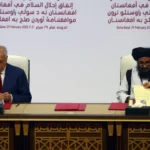Due to the Taliban\’s reluctance to attend, the broader Afghan peace conference was postponed. Therefore the foreign ministers of Afghanistan, Turkey, and Pakistan have agreed to meet in Istanbul on Friday.
Time and Date not yet Decided
Initially, on 24th April, the peace talks in Turkey were to take place. The talks aimed to expedite a deal between the Taliban and the Afghan government. According to Cavuşolu, the Afghan peace talks scheduled to take place in Istanbul this month is delayed. Therefore, will take place after the Muslim holy month of Ramadan.
The Silver Lining
The three-way meeting will cover \”latest developments about the Afghan peace process, cooperation in the fields of defence, oil, communication, and irregular migration,\” according to Turkey\’s foreign ministry.
Pakistan also encouraged the Taliban to stay involved in the Afghan peace process after the armed group\’s announcement that it would boycott all Afghan summits before all foreign forces have left.
The decision to hold these talks came after the US announced last week that it would remove all troops by September 11 this year. The new deadline is a month later than the previous administration\’s May 1 deadline.
Last month, US Secretary of State Antony Blinken sent President Ashraf Ghani a letter. According to Blinkens letter, Turkey is to hold a senior-level intra-Afghan peace conference. The conference will take place in the immediate future in order to finalize a peace agreement. Following the story, Turkey stated that it will participate in reconciliation attempts. Turkey is primed to bring peace to Afghanistan and the surrounding areas.
Not the First Trilateral Meeting
It won’t be the first time that such a trilateral summit will be taking place. Pakistan-Turkey-Afghanistan has previously conducted numerous trilateral summits, since 2007. It all started when Pakistan started to fence the border with Afghanistan which ignited a minor conflict between both countries. Ankara jumped in to solve the matter and this led to the first trilateral summit.
The summit has focused on solving issues between Pakistan and Afghanistan. Further, it has also focused on cooperation between all three countries. It covers security issues in Afghanistan to diplomatic and financial ties.




